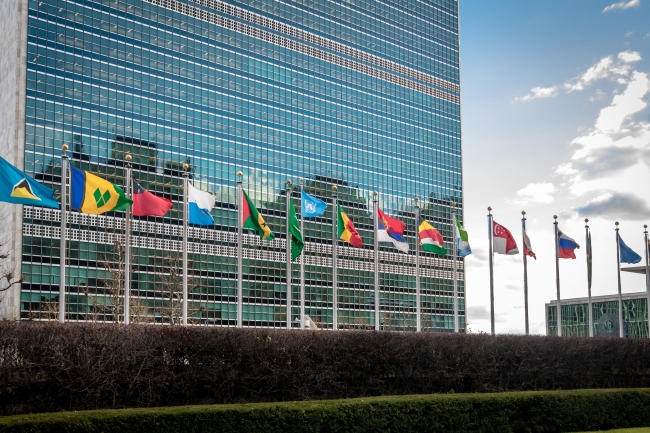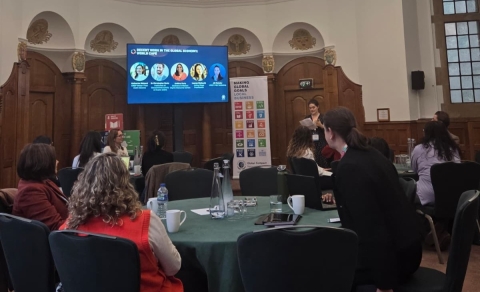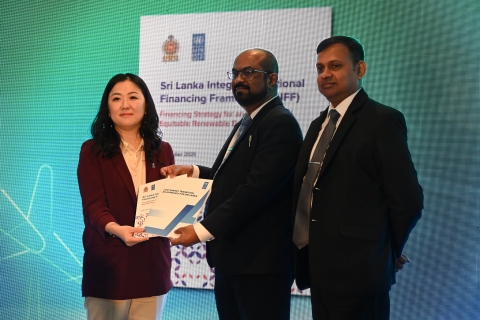UNDP holds its first Global Dialogue on Public Finance and Tax for Gender Equality
02 FEBRUARY, 2024

The 1st UNDP Global Dialogue on Public Finance and Tax for Gender Equality convening in Istanbul, Turkey and online from 6-8 February 2024 aims to be a milestone in helping drive change to advance gender equality. The dialogue draws participation from over 170 decision-makers; from high-level policymakers, tax administrators, UNDP staff, civil society, international agencies, academia, to thought leaders and partners who will explore the interlinkages between public finance, tax, and gender equality under the flagship EQUANOMICS: Fiscal Policies work for gender equality and the Tax for SDGs initiative.
The Dialogue aims to generate a shared understanding on these interlinkages; determine institutional and policy reforms required to implement tax and fiscal policies that support gender equality and expand domestic resource mobilization and to identify concrete actions to initiate policy and institutional reforms in participant countries.
The upcoming Global Dialogue will take place in the context of the 68th Session of the Commission on the Status of Women (CSW) happening from 11-22 March 2024. The CSW conference is notably the largest gathering of gender equality advocates. CSW68 is committed to accelerating the achievement of gender equality and the empowerment of all women and girls, emphasizing the critical areas of addressing poverty, strengthening institutions, and incorporating a gender perspective in financing. These key themes closely align with the topics that will be discussed during the Global Dialogue and will also underscore the 12 critical areas for urgent action as espoused in the Beijing Declaration and Platform for Action and the Addis Ababa Action Agenda.
Influencing the gender agenda through public finance and taxation
The Global Dialogue will discuss how fiscal planning can contribute to building more equitable societies while bringing evidence on how gender equality, in turn, helps leverage tax revenue. Evidence shows that fiscal policies shape economic structures and have profound implications for poverty reduction, economic growth, and equity. Better fiscal policies are a necessary condition for building gender equal economies that reduce poverty and deliver for everyone. The world is not limited in terms of assets, standing at $ 500 trillion, the issue is in its distribution, and who benefits or not. Moreover, tens of trillions of dollars are spent annually through public budgets funded by taxes across the world, and thus there is a huge potential to leverage and align public finance with gender equality objectives. The existing gender-neutral tax and fiscal systems continue to perpetuate inequalities and reinforce gender norms, but gender responsive fiscal systems can play a crucial role in shaping gender equality. The existence of gender biases in tax and fiscal policies; lack of accessible and reliable sex disaggregated data; the underrepresentation of women’s agency and gender equality impact analyses in tax policy formulation and negotiations; are a big hindrance to delivering on gender equality and prevents us from closing the gender gap in taxation and fiscal policies.
At the UNDP we are deploying diagnostics tools like the SDGs Taxation Framework (STF), – a diagnostic tool designed to helps governments align their tax systems with the 17 SDGs and identifies tax strategies that can effectively contribute to achieving specific SDG targets, including those related to gender equality (SDG 5), and other tools which look at tax and fiscal incidence, generating new knowledge through robust research methodologies as well as gender responsive budgeting and public investments. UNDP also supports Ministries of Finance and Tax Authorities to be equipped and ready to initiate reforms through The Gender Equality Seal for Public Institutions. Well aligned fiscal policies with government´s objectives on gender equality allow to expand financing for gender equality and match government ambitions and commitments with necessary investment. There is a growing acknowledgment of the imperative to incorporate gender equality considerations into tax policy and administration. Gender-responsive tax reforms therefore entail the thoughtful design and implementation of policies and systems that account for the distinct circumstances, needs, and contributions of women and men.
Fueling action at global, regional, and country levels
Each region and county represented at the dialogue will present its own specificities, during the third day of the Global Dialogue, government representatives will identify concrete actions for reforms in discussions with countries of their respective regions. With more than half of the participants attending the Global Dialogue being from Sub-Saharan countries, particular attention will be paid to the realities of this region with the Africa Day organized together with the African Tax Administration Forum (ATAF) and the Tax Justice Network (TJNA).
Focused action on gender equality will strengthen the effectiveness of government-led efforts on public finance and tax reform. For example, taking measures that incentivize women’s entry into the workforce can expand the tax base and so government’s revenue. Understanding existing discrimination and inequalities to help increase tax compliance. Ensuring equitable and gender-equal fiscal policy, including adequate social spending and progressive tax systems, is key to reduce the poverty of a country and advance inclusive growth.
Strengthened public institutions mandated with tax and fiscal policy formulation and revenue administration are necessary to achieve such an impact. Gender-responsive fiscal policies are only possible if the relevant public institutions, including Ministries of Finance and tax administrations, understand how their policy mandate relates to gender equality and if they are adequately equipped to deliver on gender equality. An integrated approach on tax and fiscal policy is critical, as well as collaboration between departments, institutions, and partners.
UNDP’s work towards making fiscal policy work for gender equality
Making fiscal policy work for gender equality is an important ambition reflected in UNDP´s Strategic Plan and a key initiative in UNDP´s Gender Equality Strategy. UNDP is uniquely placed to advocate for gender-responsive fiscal reforms globally by leveraging its presence and capacity to place gender equality at the core of fiscal policy negotiations, its integrated vision on fiscal policy, working at the same time on public expenditure and revenue, and its capacity to equip Ministries of Finance and Tax Authorities so they are ready to conduct and maintain policy reforms. EQUANOMICS takes an integrated approach, exploring how the whole public financial management cycle and fiscal governance system affects gender equality, from the way resources are mobilized through taxation to how budget programs are developed, implemented, and monitored. The Global Dialogue has been made possible through the generous support from Hewlett Foundation, the Government of Finland and Norway.











